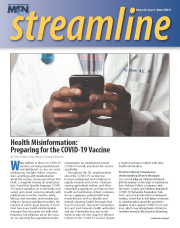
“I’ve been underestimated most of my life,” admitted Caroline Johnson, FNP. As Clinical Director at Proteus, Inc., Johnson says her successful career supporting the health of thousands of migrant agricultural workers in Iowa each year almost didn’t happen: she barely graduated college, and she struggled to get into nursing school. After six years working at a doctor’s office while attending night school, she was finally accepted into a nursing program, after which she worked for six years as an ICU nurse. She then returned to school for her family nurse practitioner certification and took a position as a pediatric home care nurse.
“My first assignment was a baby who was born at 24 weeks, days after his mother had migrated from Honduras,” Johnson recalled. She worked with the family daily, as they navigated post-NICU appointments and complications. “It was then that I realized the weight of the inequalities in our system.” She shifted her career to push back on such inequities and focus on vulnerable populations, finding Proteus, a community health center that serves thousands of agricultural workers and their families with health care, education assistance, and job training in Iowa, Indiana, and Nebraska. Johnson had found her ideal position, as Clinical Director -- but she had to further “beat down the door” of management to convince them that she was the right fit for the job. She joined the team in 2019.
In the earliest weeks of the pandemic in the US, the virus had already begun to sicken workers at meat processing plants around Iowa. Despite the outbreaks, state and federal authorities delayed implementation of emergency regulations to protect essential food workers on the job. In many parts of the country, workers still lack regulations. Johnson and her team began to fill the gap, developing farm-centered strategies for the thousands of agricultural workers that Proteus serves. Proteus contacted farm owners and contractors to help them develop and implement strategies to protect the safety of agricultural workers around the Midwest. They also contacted the governor’s office, eventually building a multi-stakeholder daily task force that included the governor’s office, the Department of Homeland Security, the state laboratory, and workforce development organizations, to coordinate and enact agricultural worker protections and testing. Daniel Hoffman-Zinnel, CEO of Proteus, began a facemask drive, and the health center eventually collected and distributed about 15,000 masks to workers around the state. Critically timed, the Health Resources and Services Administration (HRSA) provided additional funding that went directly toward Proteus’s COVID-19 response and testing efforts and advanced their initiative to begin testing agricultural workers in late April.
In mid-May, an agricultural worker tested positive for COVID-19. He had been living with six others in a farm-provided trailer. After his positive test was returned, Proteus arranged isolation housing at a hotel and provided the isolated worker with food and personal items. Proteus also tested 20 workers who were in contact with him and provided quarantine housing along with food and personal items. Of the 20 tested, seven additional cases were uncovered; those workers moved into isolation housing, and continued to receive food. Meanwhile, the employer had 50 other workers on the farm. Proteus partnered with the local and state health departments to move quickly on testing all other workers at the site. With this proactive effort, the outbreak was quickly extinguished, all COVID-19-positive workers recovered, and work disruption was minimized. The workers expressed gratitude for the provided care, which went beyond just isolation but ensured that workers had their basic needs attended to, a step that further builds the relationship between the workers and the health center.
In hopes of avoiding an even bigger outbreak, as the harvest season approached, Johnson developed a best practice to test, quarantine, and isolate workers. Johnson’s efforts caught national attention including from the CDC, and the protocol was written up as a best practice, which will support other communities in curbing infection among mobile agricultural workers. (See below for more information on this best practice.) The Proteus team, so far, has tested almost 3,000 agricultural workers, and has provided education on prevention strategies and supplies to stay safe. "Caroline has made an incredible impact not only at Proteus and with the agricultural workers she serves, but in the broader health community,” Hoffman-Zinnel and others wrote of Johnson. In a video celebrating Johnson’s efforts, Hoffman-Zinnel emphasized: “Caroline, you have saved lives.”
In 2020, MCN selected Johnson as the inaugural recipient of the Kugel and Zuroweste Health Justice Award, in recognition of her dedication to health justice in her community. Named after Candace Kugel, FNP, CNM, MS, and Ed Zuroweste, MD, two longtime MCN supporters, staff members, and champions of health justice, the award seeks to recognize a “rising star” in the world of health justice. As part of the award, Johnson received $1000. In December, MCN hosted an online celebration of Johnson, during which coworkers and collaborators shared stories of Johnson’s commitment to her community’s health in the time that she’s been Clinical Director.
For her part, Johnson remains more committed than ever. “Winning this award has reinvigorated me,” Johnson said.
The Kugel and Zuroweste Health Justice Award is an annual award given to a migrant clinician within the first five years of service. Applications for the 2021 award will open in the spring. To learn more about the award, hear Johnson’s acceptance speech, or donate to the award fund, please visit: https://www.migrantclinician.org/Kugel-Zuroweste-Health-Justice-Award.
Read this article in the Winter 2021 issue of Streamline here!
Sign up for our eNewsletter to receive bimonthly news from MCN, including announcements of the next Streamline.
